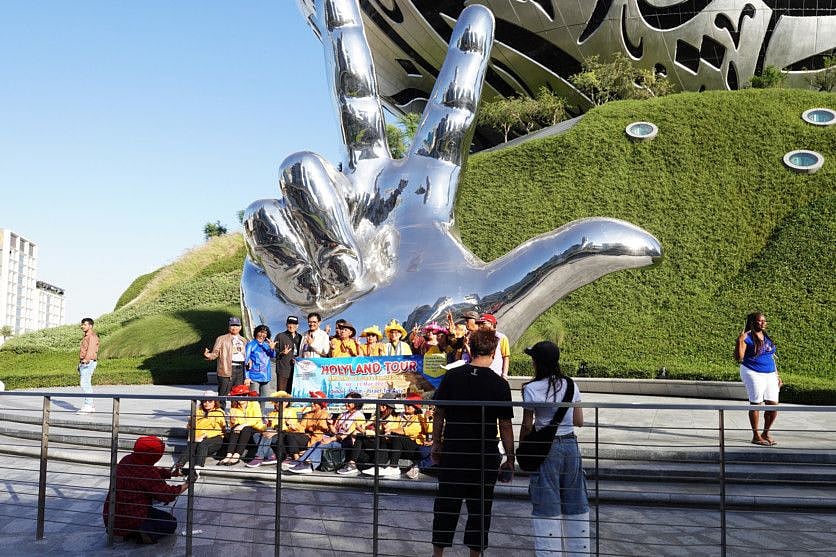Dubai tourism industry’s Q1-2023 numbers close in on pre-pandemic levels
Mega projects give Dubai’s tourism sector a strong head start to achieve long-termtargets

Dubai: Dubai’s tourism industry has begun the year 2023 on a bright note with vital growth indicators closing in on pre-pandemic levels, giving the emirate a head start in the race to achieve its strategic long-term targets over the next decade.
With public and private sector players rolling out a series of mega projects and major global hospitality brands making a beeline to invest in the emirate, tourism is set to be a big contributor to the Dubai Economic Agenda D33’s goal of doubling the city’s economy in the next 10 years. In 2022, the emirate’s tourism sector contributed $29.4 billion to its economy, according to the World Travel and Tourism Council (WTTC).
Also Read
Dubai sees 17% jump in tourists in Q1 2023 at 4.67 millionATM 2023: New 'Schengen-style' GCC unified visa for tourists, business people soonMore holiday home options in UAE as Ajman becomes latest emirate to allow short-stay rentalsATM 2023: After hotels, holiday homes could well be Saudi Arabia's next growth storyDubai’s ambitious plans for tourism growth also support a national strategy launched in November last year by His Highness Sheikh Mohammed bin Rashid Al Maktoum, Vice President and Prime Minister of the UAE and Ruler of Dubai, to attract Dh100 billion in additional tourism investments and receive 40 million hotel guests in 2031. The plan includes 25 initiatives and policies.
“Dubai’s ability to simultaneously leverage new opportunities and industry trends whilst navigating the impact of global challenges has made it one of the world’s most attractive and fastest-growing tourism and economic cities,” said Helal Saeed Almarri, Director General of Dubai’s Department of Economy and Tourism. “With a unique and diverse tourism proposition, diversified market strategy, world-leading urban infrastructure, inclusive and cohesive public-private partnership ecosystem and high safety and security, Dubai continues to be the preferred choice for global travellers.
Rising investment
Dubai has introduced a new strategic plan for exponential tourism growth powered by a massive expansion of its hospitality and leisure infrastructure. From island destinations to unique waterfront communities, Dubai is implementing new game-changing megaprojects. Consistent with Dubai’s ethos of private-public sector cooperation, the emirate’s tourism mega projects are fostering synergistic partnerships that are creating new economic value.
Recent investments have led to the growth of Dubai’s hotel stock to 148,877 rooms in 814 hotel establishments compared to 118,039 rooms in 717 hotel establishments in 2019, a rise of 26 per cent and 14 per cent respectively. Another 8,000 rooms are expected to be delivered by the end of 2023, according to KPMG.
Nakheel is set to launch the Dubai Islands comprising five islands across a total area of 17 sq. km, a destination offering a mix of residential, retail, leisure and hospitality services. A development that creates new experiences for international travellers, the Dubai Islands features 20 km of beachfront, 2 sq. km. of parks, and more than 80 hotels, including luxury and wellness resorts, and boutique, family and eco-conscious hotels.
The 6 sq. km Dubai Creek Harbour project, a joint venture between Dubai Holding and Emaar Properties set to be built over the next decade, featuring premium serviced apartments, residential complexes and parks, is set to further stimulate the city’s tourism and hospitality markets. Other major projects include Meraas’ newest seafront destination, Port de La Mer, which features six plots inspired by the elements of seaside living.
With the continued rollout of large projects, the city has steadily strengthened its position as a focal point for global tourism investments. Dubai currently holds the top global spot for FDI inflows into the tourism sector, according to The Financial Times’ fDi Markets data.
In another vote of confidence for Dubai’s emergence both as a tourism destination and a global commercial hub, Fairmont Hotels and Resorts last month relocated its global headquarters from Paris to Dubai. Fairmont’s parent company Accor said the decision was driven by the city’s “strong position as a global hub; strategic proximity to Europe, Asia, and Africa; and the city’s ability to attract top talent, brands, companies and investors.” The move reflects a larger shift in the centre of gravity of the global tourism industry from the west to the east. With nearly 40 per cent of Fairmont’s current development projects located in the IMEAT (India, Middle East, Africa and Türkiye) region, the relocation to Dubai allows Fairmont to take advantage of vast opportunities in the region’s fast-growing tourism markets.
Sign up for the Daily Briefing
Get the latest news and updates straight to your inbox
Network Links
GN StoreDownload our app
© Al Nisr Publishing LLC 2025. All rights reserved.